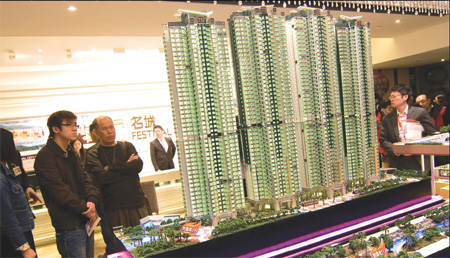Time to close, not exploit, a loophole
Updated: 2010-06-25 07:40
By HONG LIANG(HK Edition)
|
|||||||||
|
Potential buyers look at a model of Cheung Hong (Holdings) Ltd's Festival City apartment buildings at the residential development's show flat in Hong Kong on April 17, 2010. Jerome Favre / Bloomberg news |
The new rules that govern the sales of apartments in Hong Kong have proven to be confusing, ineffectual and, ultimately, unenforceable.
They were obviously conceived with good will by the government in a show of concern about the interests of a growing number of people who can no longer afford to buy homes because of escalating prices. The scope of government influence on pricing in this market-oriented economy is of course limited. But the new rules that ostensibly seek to thwart a common marketing ploy among developers to manipulate prices had, at one time, raised the hopes and expectations of many prospective home buyers.
Not anymore. Sino Land, a major developer, appears to have thumbed its nose at the rules by releasing for sale a much-lower-than expected proportion of the total number of apartments in a Tai Kok Tsui project. The company contended that its formula was in compliance with the rules of the Real Estate Developers Association. The government said it didn't have any problem with Sino's plan.
This has left many Hong Kong people perplexed. The government rules require a developer to release at least half of the "total number of flats available for sale" in the first batch. Such wording has apparently led many home buyers to expect that Sino would put up for sale at least 482 of the first 964 flats to be built in the project. Instead the company offered only 75 flats for sale.
A Sino spokesperson was quoted as saying that under the association's rules, "the minimum number of units to be included in the first price list (should) be 50 units or 50 percent of the total number of units put up for sale in each batch, whichever is higher." In this respect, Sino had more than met the minimum requirement of the rules.
On this matter, a government spokesman said: "(Sino) has selected 75 flats for the first batch and (it) is selling all of them in one go. So, it is selling 100 percent of the flats it chose."
This explanation has left one thing crystal clear: the government rules mean absolutely nothing because the developer is free to choose how many flats it wants to include in the first batch for sale irrespective of the total number of flats in that particular project. As such, developers can continue to control the supply of apartments in the market at any one time with no apparent constraint.
The argument that market forces will eventually bring about an equilibrium in supply and demand doesn't apply to the Hong Kong property market, which is not free. It is rather controlled by the government and a property oligarchy consisting of no more than five or six developers.
Despite their incestuous relationship, the government, as the biggest landowner in Hong Kong, can still call the shots when the public interest is at stake. The government is correct in addressing one of the root causes of high property prices by clamping down on market manipulation. To do so, it will need to draft rules that are clear, transparent and enforceable.
Murky rules such as those we have now will only put the government's credibility at risk. Having a developer cite rules set by the oligarchy as a precedent over government rules is nothing less than a slap in the face to the authorities. It should be enough to serve as a wake-up call for firmer government action.
(HK Edition 06/25/2010 page2)
